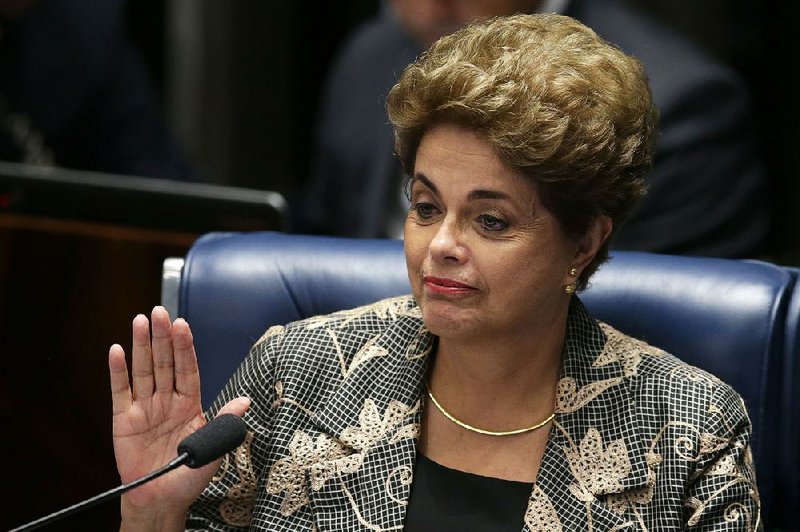BRASILIA, Brazil -- Senators deciding whether to oust President Dilma Rousseff headed into a long night of debate Tuesday, with so many wanting to speak that the judge presiding over the impeachment trial put off the final vote until today.
Many of the 81 senators signed up to speak, prompting Chief Justice Ricardo Lewandowski to announce that the vote could not happen Tuesday as originally planned. He said the trial would adjourn after all senators finished speaking, then resume this morning.
Earlier Tuesday, the fifth day of the trial, the prosecution and defense made their final arguments.
Janaina Paschoal, the lead lawyer presenting the case against Brazil's first female president, said the suspended leader had broken fiscal responsibility laws in managing the federal budget.
"We are not dealing with a little accounting problem; we are dealing with fraud," she said.
"It wasn't just that a president lied," she added. "The fraud was spoken and the fraud was documented."
Wrapping up her presentation minutes later, Paschoal came to tears when she said she hoped Rousseff would be forgiving for "having caused her to suffer."
Rousseff's attorney, Jose Eduardo Cardozo, also got emotional after presenting his defense and called Paschoal's teary comments "insulting."
The presentations came in the final phase of a political fight that has consumed Latin America's largest nation since an impeachment measure was introduced in the lower Chamber of Deputies late last year.
After the prosecution and defense presented their final arguments, the Senate was to vote on whether to permanently remove Rousseff from office.
For Rousseff to be removed, at least 54 of the 81 senators must vote in favor. Brazilian media report at least 52 senators have said they will vote for her ouster, while roughly 18 are opposed and 11 have not said which way they'll vote. In May, the same body voted 55-22 to impeach and suspend her.
Allies of Rousseff have signaled that if she is removed from office, they will take the case to the Supreme Federal Tribunal, the country's highest court. Several motions seeking injunctions were filed to the court throughout the impeachment process but failed.
Opposition senators accuse Rousseff of using illegal means to hide holes in the federal budget, saying that exacerbated a recession, high inflation and layoffs.
Rousseff, a former guerrilla fighter who was tortured and imprisoned during the country's dictatorship, calls that nonsense. She says she broke no laws and notes that previous presidents used similar accounting measures.
On Monday, she mounted that defense in the Senate, arguing that she was forced to make tough choices on the budget in the face of declining revenue and a refusal by opponents in Congress to work with her.
"I know I will be judged, but my conscience is clear. I did not commit a crime," Rousseff told senators in a 30-minute address.
Rousseff then took questions from senators for 14 hours.
"I need all of you, regardless of political parties," Rousseff said in her closing remarks to senators, urging them to keep her in the presidency. Their response was tepid.
Rousseff asserted that impeachment was the price she paid for refusing to quash a wide-ranging police investigation into the state oil company Petrobras, saying that corrupt lawmakers conspired to oust her to derail the investigation into billions of dollars in kickbacks at the oil giant.
The probe has led to the jailing of top businessmen and politicians, including members of Rousseff's Workers' Party.
One of the initial speakers Tuesday was Sen. Fernando Collor, who resigned the presidency in 1992 after being impeached by the Chamber of Deputies.
At the time, he was accused of corruption. Today he is one of the lawmakers facing accusations of corruption in the scandal at Petrobras.
"This is totally different," Collor said, hinting that he would vote for Rousseff's removal, listing alleged mistakes that the embattled leader made in office.
Collor said he, and not Rousseff, was a victim of a "coup."
Her Workers' Party was a key driver of Collor's removal from the presidency.
A Section on 08/31/2016
